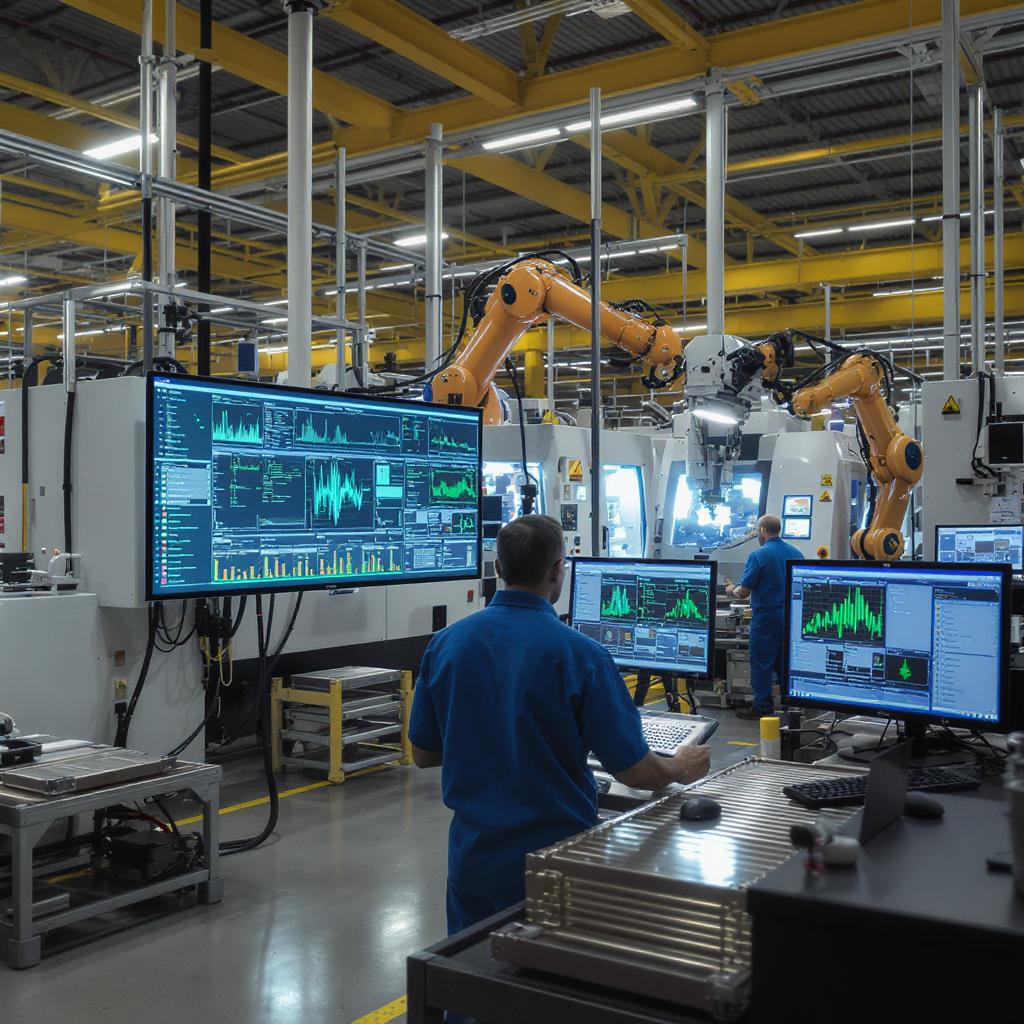
-
23/7/2025
Artificial Intelligence (AI) is revolutionizing modern manufacturing, offering unprecedented efficiency and precision across global factories. As industries strive for optimization, AI's ability to analyze data, predict outcomes, and automate complex tasks marks a transformative shift in production processes.
AI enhances predictive maintenance by alerting operators to potential machine failures, drastically reducing downtime. Sensors with AI algorithms analyze operations data, learning historical patterns to predict malfunctions proactively.
- Optimizing Production Workflow: AI streamlines production by identifying bottlenecks and suggesting real-time adjustments. This enhances operational throughput and minimizes waste by rerouting tasks and reassigning resources.
- Quality Control Enhancement: AI's advanced image recognition allows faster, more accurate product inspections than traditional methods, ensuring strict quality standards and boosting consumer satisfaction.
- Energy Management: AI integrates with smart grids, optimizing energy consumption by dynamically adjusting usage based on real-time data analysis.
AI's transformative power extends to continuous learning and adaptation, offering deeper insights and smarter decision-making. AI-driven analytics enable manufacturers to align production strategies with market trends and customer preferences.
AI fosters innovation through virtual prototyping and digital twins, simulating real-world scenarios for testing and optimization. This accelerates development cycles and reduces time-to-market for new products.
As AI's role expands, it strengthens the partnership between advanced technology and human creativity, enhancing operational efficiency and fostering innovation.
AI's precision in automated quality checks reduces errors and waste. By employing AI algorithms, manufacturing lines detect product defects with pinpoint accuracy, ensuring high-speed operations produce precise products.
- Real-World Innovation: Startups like XYZ Manufacturing Innovations use AI-driven visual inspection tools to reduce defect rates by 30%.
- Pioneering Applications: ABC Robotics employs AI systems in automotive assembly to ensure components meet precision standards, enhancing durability and consumer trust.
In supply chain management, AI's data analytics and forecasting offer insights into dynamics, anticipating demand fluctuations and optimizing operations. XYZ Logistics increased forecast accuracy by 25% with AI, reducing excess stock and aligning inventory with market needs.
- Inventory Management Excellence: ABC Retail Group uses AI for predictive analytics, reducing overstock situations by 40% and optimizing efficiency.
- Supply Chain Innovation: DEF Automotives employs AI for precise logistics, reducing lead times and enhancing productivity.
AI's customization capabilities transform mass production into a flexible, consumer-centric process. In consumer electronics, AI algorithms assess preferences, offering personalized devices. AI-driven platforms in apparel provide custom-fit clothing through image recognition and body scanning technologies.
- Personalized Furniture: DEF Furniture Co. uses AI for bespoke designs, reducing waste by matching products to consumer demands.
- Customized Health and Beauty Products: ABC Naturals employs AI to recommend skincare routines tailored to individual needs.
AI enhances workplace safety with automated hazard detection and worker monitoring. AI sensors swiftly identify hazards, ensuring timely interventions that protect employees.
- Proactive Monitoring for Safety: AI tools analyze data to predict unsafe conditions, reducing workplace accidents.
- Alert Systems and Emergency Protocols: AI systems provide notifications for detected hazards, deploying emergency protocols to safeguard personnel.
While AI promises immense benefits, challenges like data privacy and workforce displacement must be addressed. Stringent data governance policies protect sensitive information, while reskilling empowers workers to adapt to new AI-enhanced roles.
Ethical considerations are vital in AI development, ensuring systems are fair, inclusive, and devoid of bias. Collaborations across stakeholders can ensure AI enhances manufacturing processes while aligning with social and environmental objectives.
AI's full potential lies in seamless integration across production stages, steering towards fully autonomous factories that optimize productivity and quality with minimal intervention.
- Continued Learning and Adaptation: Engage with AI literacy resources to position yourself as a forward-thinking leader in the industry.
- Connecting with AI Innovations: Collaborate with AI solution providers like MPL.AI for practical insights and opportunities aligned with organizational goals.
MPL.AI is committed to responsible innovation, ensuring AI enriches the manufacturing ecosystem and broader societal goals.
